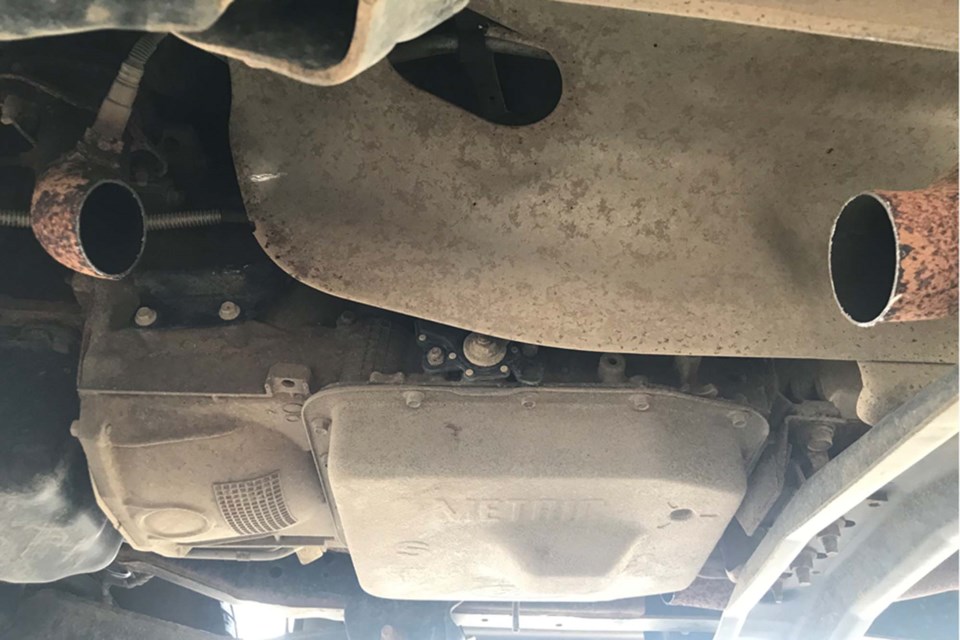Catalytic converter thefts are hitting closer to home than ever. Back in August 2019, the St. Albert Gazette parked two delivery vans in the company's well-lit parking lot installed with security cameras. Catalytic converters from both vans were cut out.
To repair the damage of a 2011 Ford E350, the cost was $2,377.15. Repairs to a 2014 Ram ProMaster peaked at around $11,000. The total cost for both vehicles exceeded $13,500.
“The ProMaster was a diesel engine, and it had a very complex emission system. [The thieves] cut into a bunch of other sensors and components. The cost for a repair job can depend on where they cut into the catalytic converter,” said Evan Jamison, vice-president of manufacturing for Great West Newspapers, which owns The Gazette.
Don Meier, assistant manager at Tire Craft, has seen a “substantial rise” in these crimes of opportunity.
“It’s definitely been a problem in the last two to three years. We’ve even had some vehicles in our parking lot that had the catalytic converters cut out. We see about five or six vehicles a year. That doesn’t sound like a lot. But it shouldn’t be happening,” said Meier.
The most expensive bill he recalls was for a 2008 Ford vehicle that rang in at $3,400.
“It was an older vehicle and it was getting close to being a write-off for the insurance company.”
Over at Fountain Tire, owner and manager Todd Lesenko sees about 40 to 50 vehicles a year that need catalytic converters. A few vehicles' emission parts degrade through wear and tear over time. Most are in the shop due to thefts.
“It’s enough to make a person mad. One of the biggest thefts I see are motorhomes in storage areas. Scrap yards pay a ton of money for them,” said Lesenko. “It’s terrible. It’s affected a whole bunch of people who shouldn’t be affected, especially seniors. I have a real problem with that.”
On Nov. 1, 2020, the Alberta government passed the Protecting Alberta Industry from Theft Act. Its aim was to make it tougher for criminals to sell stolen metals for scrap.
The legislation requires all scrap metal dealers to report transactions to law enforcement. Dealers buying from Joe-Q public must be licensed and make payments using traceable forms of currency, such as electronic transfers or cheques. Depending on the crime, fines doubled and tripled. Jail time was also increased.
Despite legislation, Alberta RCMP reported almost a doubling of thefts. There were 1,147 thefts from January to Nov. 11, 2021, compared to 647 thefts in 2020.
Catalytic converters are part of a vehicle's exhaust system that converts pollutants to less toxic materials. They contain small amounts of precious metals such as platinum, palladium and rhodium that have risen sharply in value in recent years. Several factors play into their high cost: limited amounts, high demand, and supply chain issues. Criminals often steal converters and exchange them to “middle men” for drugs or money.
Cpl. Troy Savinkoff of RCMP K-Division explained that several years ago, thefts were initially in large centres such as Edmonton and Calgary, but have since expanded into rural areas.
“Because of the materials in the device, a criminal can get $150 to $200 at the recycle yard. A replacement costs a vehicle owner $650 plus for a new installation. It’s a real issue and it victimizes people significantly.”
He recalls watching a surveillance video of a thief who crawled under a car and cut with a relatively inexpensive Sawzall.
“It took one minute. It created quite a bit of noise, but he was in and out in one minute.”
As an added measure of protection, some auto repair shops, such as Fountain Tire, are welding rebar to newly installed catalytic converters.
“It’s not as easy to cut through. It will take 20 to 30 minutes,” Lesenko pointed out.
Despite the new legislation, enforcement is difficult, agreed Savinkoff.
“When police do patrols, we do come across vehicles carrying stolen property. We’re often hampered if the items are stolen, but can’t be identified — tools in particular. We suspect the person has stolen them, but we can’t prove it.”
As catalytic converter thefts have spiked across the Edmonton region, Leduc RCMP have taken an extra step in combating these quick crimes. The city saw dramatic increases in catalytic converter thefts: 29 reported in 2019; 106 in 2020; and by Dec. 21, 2021, 150 catalytic converters had been stolen. A media release stated the majority were from trucks.
To fight this rising issue, the RCMP have partnered with Leduc businesses to create the “You Etch It. We Catch It” program. It involves etching the first eight digits of a VIN number onto a vehicle’s catalytic converter. Etching the VIN is performed at no cost to customers and assists officers in identifying stolen property.
“It’s something the police community is looking into. Our biggest problem is that if we arrest someone, we can’t always connect them to the actual offence and lay charges.” Savinkoff said. Etching VIN numbers gives them the ability to do that.
Leduc Fountain Tire is one of the businesses partnering with RCMP to etch VIN numbers. When Lesenko was asked if he would participate if St. Albert RCMP offered an etching program, he replied, “In a heartbeat.”
St. Albert RCMP said it does not have a program like the one in Leduc to track catalytic converters. Cpl. Morgan Kyle said in an email on Tuesday theft of the car parts jumped five-fold between 2019 and 2020. In 2019 there were 22 calls for catalytic converter thefts; 107 in 2020. Before Dec. 21, 2021, there were 70 calls.
With files from Jennifer Henderson




